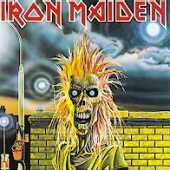Iron Maiden - Official Website
Iron Maiden |
United Kingdom
 |
|---|

Review by Dominik on April 12, 2025.
I know. Another review of Iron Maiden’s debut—just what the world needed. If I had a dollar for every word written about this record, I’d be dictating this review from my private island. I won´t even try to come up with aspects that have not been looked at already as I don´t have any clue where to find them. Iron Maiden’s debut album has been dissected from every possible angle—its influence on the New Wave of British Heavy Metal (NWOBHM), the raw energy, Paul Di’Anno’s streetwise vocals, and how it set the foundation for one of the most enduring bands in metal history.
Still, here I am, adding to the pile. But instead of pretending I’ve unearthed some groundbreaking insight; I’ll tell you why this album still grabs me by the collar decades later. Because for me, this album isn’t just another metal classic—it’s the album that dragged me headfirst into the world of heavy metal. And once you fall down that rabbit hole, there’s no climbing back out.
It all started with “Running Free”. Out of nowhere, Iron Maiden showed up on some obscure German TV broadcast in 1980, and my twelve-year-old brain didn’t stand a chance. I had no fucking idea what I was hearing, but I knew it was different—faster, louder, and a hell of a lot more rebellious than anything else around. Sure, I had flirted with AC/DC and some rougher Status Quo tracks, but this? This was a band that sounded like they didn’t just break the rules—they didn’t even bother to read them and had a lot of fun deviating from societally accepted norms in those days. Paul Di’Anno’s bratty, street-punk snarl felt like the voice of every kid who ever argued with their parents, teachers, or anyone else who tried to keep them in line. He sounded like the guy your parents warned you about—and as a restless kid, that was exactly what I needed.
One thing led to another (as it tends to when you’ve been bitten by the metal bug), and by the time “Killers” came around, two friends and I had sweet-talked our parents into letting us see Iron Maiden live. Three wide-eyed kids, rocking in blood-splattered “Killers” shirts, screaming our lungs out in a sea of leather-clad maniacs, who were surprisingly tolerant of our teenage enthusiasm. And yet, for all the magic of that night, it’s the debut album my loyalty always circles back to.
And a big part of that loyalty comes down to Paul Di’Anno. Now, don’t get me wrong—Bruce Dickinson is a technical powerhouse, who can sing circles around almost anyone and he took Maiden to stadium-filling heights. But Di’Anno brought something you can´t train for: attitude. Paul´s sometimes punk-infused delivery, particularly on tracks like “Prowler” or “Running Free”, adds a vulnerability and working-class grit that Dickinson’s more “operatic” style never aimed to replicate. So for me, the band lost a sense of danger when they became more polished with releasing “The Number of the Beast”. In a NWOBHM way “Iron Maiden” is a louder cousin to the punk movement's discontent. You can practically smell the diesel fumes and cheap beer. What makes the often criticized raw and almost undercooked production the right choice for this album.
Musically, the album sometimes is a balancing act between two worlds. On one side, you’ve got some fast, punk-tinged aggression. On the other, “Phantom of the Opera” hints at the sprawling, progressive epics to come. It’s the sound of a band still figuring themselves out—halfway between the pub and the coliseum—but that tension is exactly what makes the album exciting.
And then there’s Eddie, because no conversation about this album is complete without him. Iron Maiden as a brand would never have worked so well without Eddie, whose appearance on the debut’s cover marked the beginning of one of metal’s most iconic mascots. In a way Eddie wasn’t just album art—he was an ethos. In an era when other metal bands were content with leather and studs, Maiden built an entire mythology around a decaying zombie who embodied their mix of danger, humor, and a bit of gleeful anarchy.
If you want to understand how crucial this album is, play a little game of "what if – an alternate history". What if “Iron Maiden” had flopped? How might the metal landscape look today if Steve Harris’s vision had never left the East London pub scene? One could explore how the album’s success didn’t just birth Maiden’s empire but also validated a DIY, working-class ethic in heavy metal—proving that young bands could self-produce, tour relentlessly, and succeed without mainstream approval. Would the NWOBHM explosion have happened without Maiden kicking the doors open? Probably yes, but not with the same flair.
At the end of the day, “Iron Maiden” is far from perfect—but that’s part of what makes it so vital. It’s the sound of a young band with everything to prove, clawing their way into history. And they didn’t just knock on the door—they kicked it wide open. There shouldn’t be any doubt that the album belongs into the pantheon of classics.
Rating: 8.5 out of 10, because sometimes a rough diamond shines the brightest.
1.36k